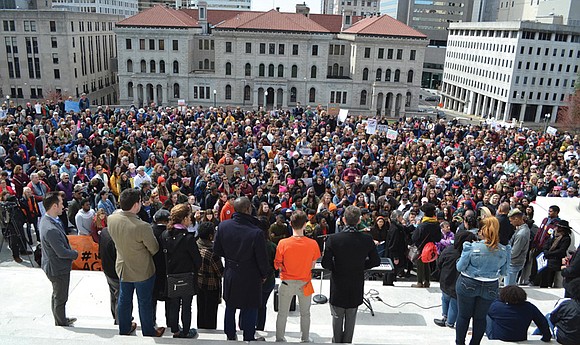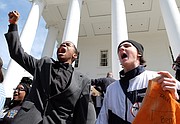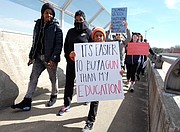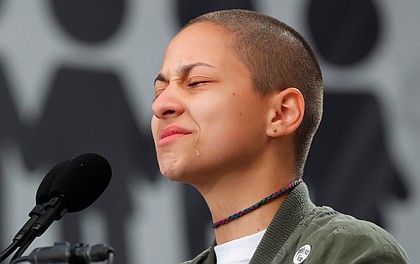‘Our ballots will stop bullets’
Thousands take to streets in Richmond, D.C. and across the nation to demand gun control and school safety
3/30/2018, 10:57 a.m.

IN RICHMOND
By Irena Schunn
and George Copeland Jr.
Capital News Service
Chanting “Enough is enough” and “Never again,” more than 5,000 students and other demonstrators marched through Richmond last Saturday as part of a nationwide protest against mass school shootings and gun violence.
Cheering against the chilly breeze, the Richmond march started with a bevy of student speakers alongside prominent local and state leaders on the lawn of Martin Luther King Jr. Middle School on Mosby Street in the East End.
Throngs of people of all ages then marched across the Martin Luther King Bridge to Capitol Square in Downtown, where they heard from more students speaking at a rally outside the state Capitol.
The array of signs they carried proclaimed their succinct messages:
“We want education without fear of annihilation,” “Books not bullets,” “Arm schools with more counselors, psychologists, nurses,” “Learning not lockdown,” “Protect our children, not guns,” “Disarm hate,” “Thoughts and prayers don’t stop bullets” and “Is my grandson next? Stop the violence.”
At the start of the rally, U.S. Sen. Tim Kaine, a Richmond resident and former Democratic vice presidential candidate, expressed pride in seeing the action taken by students in his home state.
“Congress and the General Assembly — of not just this state but of other states, too — have a hard time finding a way to do anything because of the power of gun manufacturers and NRA leadership. But they’ve never had to come up against high schoolers before,” Sen. Kaine said to the cheering crowd.
The youth-centric nature of the march was present in the speeches and chants heard throughout the day. Once the march reached the Capitol, the younger speakers took the lead as state legislators and Richmond School Board members deferred to their voices. Students repeatedly called on older participants to protect them by doing what they can’t — vote for gun reform.
Maxwell Nardi, a student speaker from Douglas S. Freeman High School in Henrico County, was one of many to call for changes in school safety, universal background checks for firearm purchases and the removal of politicians unwilling to support gun control.
“This isn’t a new issue,” Maxwell said. “It’s been happening for 19 years in school shootings, and gun violence has been plaguing America for a much longer time.”
Speakers also emphasized the greater impact gun violence has on the African-American community, tying it to historical acts of violence against minorities.
“How many more black families will be devastated by gun violence — threatened or killed by the people whose job it is to serve and protect?” Stephanie Younger, an activist with the Richmond Youth Peace Project, asked the crowd.
“How many more times do my parents have to give me that talk explaining to me that I’m 10 times more likely to become a victim of gun violence because I am black?”
Maxwell echoed her sentiments, saying, “We have to look at this both from the perspective of schools and also from the perspective of communities that have been disproportionately impacted by this.”
Speakers also drew attention to Virginia’s history with guns, particularly the 2007 massacre at Virginia Tech in which 32 people were killed and 17 others were wounded, as well as the National Rifle Association’s presence in the state politically and geographically (its headquarters is in Fairfax).
The March for Our Lives, with its main rally in Washington, was a student-led call for action with more than 800 sibling marches worldwide. It was planned in the wake of the mass shooting at Marjory Stoneman Douglas High School in Parkland, Fla., on Feb. 14, when a former students armed with a semi-automatic, military-style rifle killed 14 students and three staff members. Since then, surviving students launched the Never Again movement and urged lawmakers to impose stricter gun laws.
Calling the message from Richmond’s youth “powerful,” Richmond Mayor Levar M. Stoney said, “I am more inspired walking out than ever before. I think there’s a real possibility for change and I leave here today filled with optimism.”
IN DC
Free Press wire reports
WASHINGTON
Hundreds of thousands of teenagers and their supporters rallied across the United States against gun violence last Saturday, vowing to transform fear and grief over student killings in schools into a political movement that would yield stronger gun laws, including restoration of bans on the purchase of military-style weapons and stronger background checks.
Marchers for tougher gun laws took to the streets of the nation’s capital and for sister marches in more than 800 other cities worldwide, including Richmond, Boston, New York, Chicago, Houston, Minneapolis, Phoenix, Los Angeles and Oakland, Calif.
The turnout rivaled the kind of numbers seen during the 1960s protests over civil rights and the Vietnam War.
The protests swept up activists long frustrated by the stalemate in the gun debate and brought in new, young voices. Many weren’t old enough to buy a beer or to rent a car. And thousands of others, who still aren’t old enough to vote, were among the estimated 800,000 people in Washington raising their voices to demand change.
Still, the big question is whether this was a blip or will translate into votes and the election of political representatives willing and able to break the stranglehold that the National Rifle Association has secured over gun legislation.
Participants were called to action by a brand-new corps of leaders: Student survivors of the school shooting in Parkland, Fla., that left 17 people dead Feb. 14.
“If you listen real close, you can hear the people in power shaking,” Parkland survivor David Hogg said to roars from the protesters packing Pennsylvania Avenue from the stage near the Capitol many blocks back toward the White House. “We’re going to take this to every election, to every state and every city. We’re going to make sure the best people get in our elections to run, not as politicians, but as Americans.
“Because this,” he said, pointing behind him to the Capitol dome, “this is not cutting it.”
Some of the voices were very young. Yolanda Renee King, the 9-year-old granddaughter of the late Dr. Martin Luther King Jr., drew from the civil rights leader’s most famous words in declaring from the stage: “I have a dream that enough is enough. That this should be a gun-free world. Period.”
The signs were everywhere: “Prayers are not enough.” “The Second Amendment needs amending.”
The NRA went silent on Twitter as the protests unfolded, in contrast to its reaction to the nationwide school walkouts against gun violence on March 14, when it tweeted a photo of an assault rifle and the message, “I’ll control my own guns, thank you.”
President Trump was in Florida for the weekend and did not weigh in on Twitter either.
White House spokesman Zach Parkinson said, “We applaud the many courageous young Americans exercising their First Amendment rights today.” He pointed to President Trump’s efforts to ban bump stocks and his support for school safety measures and extended background checks for gun purchases.
Since the bloodshed at Marjory Stoneman Douglas High School in Florida, students have tapped into a current of gun control sentiment that has been building for years — yet still faces a powerful foe in the NRA, its millions of supporters and lawmakers who have resisted any encroachment on gun rights.
Organizers are hoping the electricity of the crowds, their sheer numbers and the under-18 roster of speakers will create a tipping point, starting with the midterm congressional elections this fall. To that end, chants of “Vote them out!” rang through the Washington crowd.
Emma Gonzalez, one of the first students from Stoneman Douglas High School to speak out after the tragedy there, implored those of voting age to vote.
In her speech in Washington, she recited the names of the Parkland dead, then held the crowd in rapt, tearful silence for more than 6 minutes, the time it took the gunman to kill them.
“We will continue to fight for our dead friends,” Delaney Tarr, another Parkland survivor, declared from the stage. The crowd roared with approval as she laid down the students’ central demand: A ban on “weapons of war” for all but warriors.
Student protesters called for a ban on high-capacity magazines and assault-type weapons like the one used by the killer in Parkland, comprehensive background checks, and a higher minimum age to buy guns.
Gun violence was fresh for some who watched the speakers in Washington. Ayanne Johnson of Great Mills High School in St. Mary’s County, Md., held a sign declaring, “I March for Jaelynn,” honoring Jaelynn Willey, who died March 22, two days after being shot by a classmate at the school. The gunman also died.
About 30 gun-rights supporters staged a counter-demonstration in front of FBI headquarters, standing quietly with signs such as “Armed Victims Live Longer” and “Stop Violating Civil Rights.” Other gun control protests around the country were also met with small counter-demonstrations.
The president’s call to arm certain teachers fell flat at the protest, and from critics as young as Zoe Tate, 11, from Gaithersburg, Md.
“I think guns are dumb. It’s scary enough with the security guards we have in school,” she said. “We don’t need teachers carrying guns now. I find it amazing that I have to explain that idea to adults.”
Parkland itself was home to a rally as more than 20,000 people filled a park near the Florida school, chanting slogans such as “Enough is enough” and carrying signs that stated: “Why do your guns matter more than our lives?” and “Our ballots will stop bullets.”
Around the country, protesters complained that they are scared of getting shot in school and tired of inaction by grown-ups after one mass shooting after another.
“People have been dying since 1999 in Columbine (Colorado) and nothing has changed. People are still dying,” said Ben Stewart, a 17-year-old senior at Shiloh Hills Christian School in Kennesaw, Ga., who took part in a march in Atlanta.
Callie Cavanaugh, a 14-year-old at a march in Omaha, Neb., said, “This just needs to stop. It’s been going on my entire life.”










